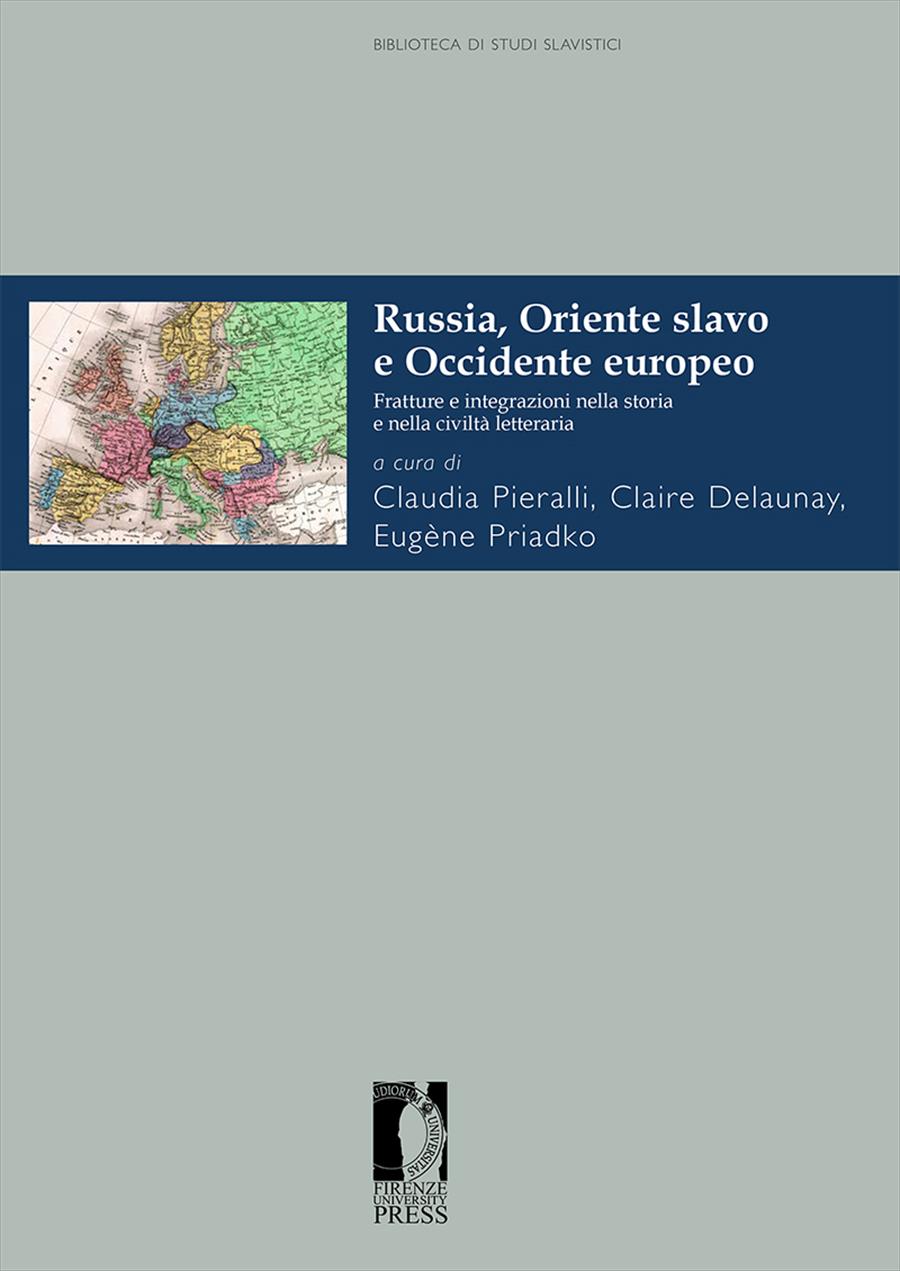- Russia, Oriente slavo e Occidente europeo. Fratture e integrazioni nella storia e nella civiltà letteraria
- Edited by Claudia Pieralli, Claire Delaunay, Eugène Priadko
Between Kafka and Gogol’. ‘De-territorialising’ National Narrative(s) in Post-Soviet Ukrainian Literature in Russian
- Marco Puleri
- © 2017 Author(s) |
- CC BY 4.0
- DOI: 10.36253/978-88-6453-507-4.26
Between Kafka and Gogol’. This suggestive title reflects the path that will be undertaken in this paper, approaching the two authors as privileged interlocutors in order to analyze the specific artistic dimension of the newest category of writers that has emerged in Ukraine following the post-Soviet historical fracture. Through the lenses of the peculiar features characterizing Franz Kafka’s and Nikolaj Gogol’s literary experiences, we will be able to highlight the nuances characterizing the specific cultural positioning of contemporary Ukrainian literary production in Russian.
- Keywords:
- Ukrainian russophone literature,
- post-soviet Literature,
- A. Nikitin,
- deterritorialization,
University of Bologna, Italy - ORCID: 0000-0002-9360-0296
- Andriewsky, O. 2003. “The Russian-Ukrainian Discourse and the Failure of the ‘Little Russian Solution’, 1782-1917”, in A. Kappeler et al. (eds.). Culture, Nation and Identity: The Ukrainian-Russian Encounter, 1600-1945. Edmonton: 182-214.
- Besedin, P. 2013. “Aleksej Nikitin: Isčeznovenie ljubogo jazyka ‒ utrata dlja strany”. Šo, IX-X: 62-69.
- Bilaniuk, L.M. 2009. “Criticism, confidence, and the reshaping of the linguistic marketplace in Ukraine”, in L.M.L. Zaleska Onyshkevych, M.G. Rewakowicz (eds.). Contemporary Ukraine on the Cultural Map of Europe. New York: 336-358.
- Blacker, U. 2014. “Blurred Lines: Russian Literature and Cultural Diversity in Ukraine”. The Calvert Journal, <http://calvertjournal.com/comment/show/2176/russianculture-in-ukraine-literature>, 17/03/2014.
- Bojanowska, E.M. 2007. Nikolaj Gogol: Between Ukrainian and Russian Nationalism. Cambridge-London.
- Chernetsky, V. 2007. Mapping Postcommunist Cultures: Russia and Ukraine in the Context of Globalization. Montreal.
- Čuprinin, S. 2008. Russkaja literatura segodnja: Zarubež’e. Moskva.
- Deleuze, G., Guattari, F. 1986. Kafka. Toward a Minor Literature. Tr. D. Polan. Minneapolis-London (ed. or. Kafka. Pour une littérature mineure. Paris 1975).
- Foucault, M. 1970. The Order of Things: An Archaeology of Human Sciences. Tr. A.M. Sheridan Smith. New York (ed. or. Les Mots et les Choses. Paris 1966).
- Foucault, M. 1984. Of Other Spaces: Utopias and Heterotopias. Tr. J. Miskowiec. [s.l.] (ed. or. Des Espaces Autres, “Architecture/Mouvement/Continuité”, 5 October 1984: 46-49), <http://web.mit.edu/allanmc/www/foucault1.pdf>.
- Gogol’, N.V. 1952. Polnoe sobranie sočinenij, XII. Moskva.
- Grabowicz, G.G. 1992. “Ukrainian-Russian Literary Relations in the Nineteenth Century: A Formulation of the Problem”, in P.J. Potichnyj et al. (eds.). Ukraine and Russia in Their Historical Encounter. Edmonton: 214-244.
- Grabowicz, G.G. 1994. “Hohol’ i mif Ukrajiny”. Sučasnist’, IX-X: 77-92, 137-149.
- Ilchuk, Y. 2009. Gogol’s Hybrid Performance: The Creation, Reception and Editing of Vechera na Khutore Bliz Dikanki (Evenings on a farm near Dikan’ka, 1831-32). A dissertation presented to the Faculty of the USC Graduate School, University of Southern Car
- Ilnytzkyj, O.S. 2002. “Cultural Indeterminacy in the Russian Empire: Nikolai Gogol as a Ukrainian Post-Colonial Writer”, in P.D. Morris (ed.). A World of Slavic Literatures. Essays in Comparative Slavic Studies in Honour of Edward Mozejko. Bloomington-Ind
- Ilnytzkyj, O.S. 2003. “Modeling Culture in the Empire: Ukrainian Modernism and the Death of the All-Russian Idea”, in A. Kappeler et al. (eds.). Culture, Nation and Identity: The Ukrainian-Russian Encounter, 1600-1945. Edmonton: 298-324.
- Kochanovskaja, T., Nazarenko, M. 2012. “Ukrainskij Vektor: Istorija s geografiej. Kievskie gory i nory”. Novyj Mir, 10, <http://magazines.russ.ru/novyi_mi/ 2012/10/u21.html>.
- Krasnjaščich, A. 2015. “Rusukrlit kak on est’”. Novyj Mir, IX: 173-197.
- Kukulin, I. 2007. “Ot redaktora”. Novoe Literaturnoe Obozrenie, LXXXV, <http://magazines.russ.ru/nlo/2007/85/ik18.html>.
- Lloyd, D. 1987. Nationalism and Minor Literature. James Clarence Mangan and The Emergence of Irish Cultural Nationalism. Berkeley-Los Angeles-London.
- Luckyj, G.S.N. 1998. The Anguish of Mykola Hohol a.k.a. Nikolaj Gogol. Toronto.
- Mann, Ju.V. 1999. “Vstreča v labirinte. Franz Kafka i Nikolaj Gogol’”. Voprosy literarury, II, <http://magazines.russ.ru:8080/voplit/1999/2/mann.html>.
- Masenko, L. 2008. “Language Situation in Ukraine: Sociolinguistic Analysis”, in J. Besters-Dilger (ed.). Language Policy and Language Situation in Ukraine. Frankfurt am Main: 101-137.
- Meležik, L. 2013. “Russkij ili Russkoiazyčnyj: samoidentifikacija pisatelja vne Rossii”. Svobodnaja Pressa, <http://svpressa.ru/culture/article/76791/?rss=1>, 04/11/2013.
- Nazarenko, M. 2005. Real’nost’ čuda. Kiev.
- Nikitin, A. 2011. Istemi. Moskva (en. ed. di A.M. Jackson. Istemi. London 2013).
- Nikitin, A. 2012. Madžong. Moskva.
- Nikitin, A. 2014. Victory Park. Moskva.
- Puleri, M. 2014. “Ukraïns’kyi, Rosiis’komovnyi, Rosiis’kyi: Self-Identification in Post-Soviet Ukrainian Literature in Russian”. Ab Imperio, 2: 367-397.
- Puleri, M. 2015. “L’ibrido assente: ‘Immaginando’ lo spazio letterario ucraino”. Between, V.9, <http://ojs.unica.it/index.php/between/article/view/1395>.
- Puleri, M. 2015. “Uno sguardo al passato. Dinamiche identitarie nel contesto ucraino post-sovietico”, in I. Both et al. Innesti e ibridazione tra spazi culturali. Firenze: 65-86.
- Puleri, M. 2016. Narrazioni ibride post-sovietiche: per una letteratura ucraina di lingua russa. Firenze.
- Serebrjakova, E. 2014. “Aleksej Nikitin: Ja mifologiruju Kiev, i delaju eto soznatel’no”. Piši-čitaj, <http://write-read.ru/news/1436>, 14/05/2014.
- Shkandrij, M. 2001. Russia and Ukraine: Literature and the Discourse of Empire From Napoleonic to Postcolonial Times. Montreal.
- Shkandrij, M. 2009. “The Postcolonial Moment in Ukrainian Writing”. Postcolonial Europe, <http://www.postcolonial-europe.eu/pl/studies/70-the-postcolonial-momentin-ukrainian-writing.html>, 29/04/2009.
- Sochareva, T. 2014. “Večera na chutore bliz promzony”. Gazeta.ru, <http://www.gazeta.ru/culture/2014/05/14/a_6032653.shtml>, 14/05/2014.
- Toporov, V. 2012. “Ne lez’, podskazčik, k igrokam”. Fontanka.ru, <http://www.fontanka.ru/2012/05/30/070/>, 30/05/2012.
Chapter Information
Chapter Title
Between Kafka and Gogol’. ‘De-territorialising’ National Narrative(s) in Post-Soviet Ukrainian Literature in Russian
Authors
Marco Puleri
Language
English
DOI
10.36253/978-88-6453-507-4.26
Peer Reviewed
Publication Year
2017
Copyright Information
© 2017 Author(s)
Content License
Metadata License
Bibliographic Information
Book Title
Russia, Oriente slavo e Occidente europeo. Fratture e integrazioni nella storia e nella civiltà letteraria
Book Subtitle
Fratture e integrazioni nella storia e nella civiltà letteraria
Editors
Claudia Pieralli, Claire Delaunay, Eugène Priadko
Peer Reviewed
Publication Year
2017
Copyright Information
© 2017 Author(s)
Content License
Metadata License
Publisher Name
Firenze University Press
DOI
10.36253/978-88-6453-507-4
eISBN (pdf)
978-88-6453-507-4
eISBN (xml)
978-88-9273-190-5
Series Title
Biblioteca di Studi Slavistici
Series ISSN
2612-7687
Series E-ISSN
2612-7679
